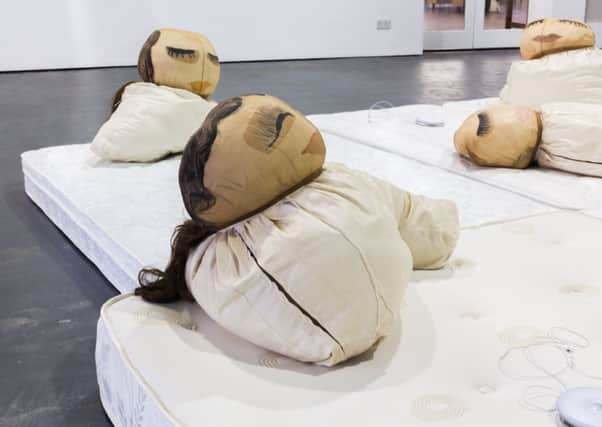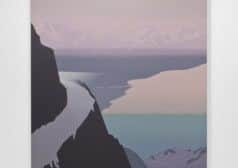Art reviews: Till the stars turn cold | Alex Dordoy


Till the stars turn cold
Glasgow Sculpture Studios
Star rating: ****


Alex Dordoy: Model T
Modern Institute, Glasgow
Star rating: ***
Beauty and the Right to the Ugly
Collective, Edinburgh
Star rating: ***
Someone I know who works in the music business once messed up the backing music for one of the most famous pop stars on the planet as she performed in front of a global audience. He created a glitch that meant the music looped repeatedly. She kept calm (or to be more accurate kept appropriately frenzied) and kept dancing to the same musical phrase, again and again until order was restored. But by the end, he later reported, the queen of pop was more plain crazy than Crazy in Love.
Technology takes us to all sorts of exciting places, but it can also take us into strange new territories and into funny little gaps and interstices when it breaks down. This is, at least in part, the theme of Till the stars turn cold, a group show at Glasgow Sculpture Studios about the use of language in the digital age with a line-up that includes Michael Dean, Kathryn Elkin and Megan Rooney.
Advertisement
Hide AdThe most famous example in pop music of a digital cockup is not the consummate pop star above, but the pop duo Milli Vanilli, a pair of brilliant professional dancers tasked with lip-synching to the recorded music of Munich disco Svengali Frank Farian. When their digital track broke down at the MTV awards in 1989, it became apparent that Milli Vanilli didn’t, and couldn’t, actually sing.
‘The New Elvis’, artist Cally Spooner’s erudite essay for the exhibition, is both a potted history of the affair and melancholic mediation on voice and authenticity. Spooner has recently worked with a Broadway chorus line on similar themes. Her short video on show in Glasgow, Baby I got better things to be doing with my time, shows a PVC clad pop star crashed out on the studio floor in a fit of ennui.
Till the stars turn cold has been put together by the critic and curator Laura Maclean-Ferris and Kyla McDonald, who has been a breath of fresh air in Glasgow since she joined GSS as programme manager. There is much in the show that merits a long visit, not least Tyler Coburn’s series of screenprints, which might take hours to decode. They tell the story of Oscar Wild’s trial. Wilde was “betrayed” by his own words and poetry, but Coburn presents the story in a flaming psychedelic font that is near impossible to read. The allusion is simple: Wilde was hiding in plain sight.
At the Modern Institute’s Aird’s Lane space, Alex Dordoy also wrestles with the question of authenticity and the advent of communication technology. Like that of many contemporary painters Dordoy’s art is about being torn between painting’s seductive power and its technological redundancy. The Scottish National Gallery of Modern Art has just announced that it has acquired Sleepwalker, Dordoy’s sequence of three paintings featuring a catamaran gliding into the sunset. Model T is a similar series of paintings taking a poster art image of misty Austrian scenery, repeated in flat planes and numerous heather-toned colour schemes. There is something deliberately narcotic about Dordoy’s recent works, like being caught in an endless and soothing soundtrack of elevator muzak: perfectly meaningless and smoothly textured. I love them and the curious silicon casts of the artist’s jeans that are scattered about the space. Caught between painting’s slow exit and the relentless rise of digital imaging, Dordoy is like Reggie Perrin, staging his own disappearance again and again.
The difference between our dreams and prosaic reality are the subtext for Beauty and the Right to the Ugly, a new trilogy of films staged in an installation by the Dutch artist Wendelien van Oldenborgh at Collective in Edinburgh. Set in Het Karregat, a pyramid shaped multifunctional community centre in Eindhoven, the films bring together the people who once populated this experimental open plan space. There is the architect whose dream has been eroded, a doctor who once ran a community health facility, the teacher who struggled to teach children in a school without walls and the barman whose bar was the centre of social life. All the players seem to regret the centre’s gradual change. Walls have been erected, exits barred. What once was open and exciting is now privatised and closed off. The huge concerts that once took place are no longer possible. Neighbourhood watch stickers have appeared on newly erected glass partitions. This is the paranoid neo-liberal world we live in.
The truth, inevitably, is more complex. The education experiment was not community led, but a top down exercise led by intransigent education officials. The barman regrets his loss of earnings when the place became smaller. A modern entrepreneur, who spent time in the community centre as a child, says that the place taught him anything was possible. What it actually taught him was that hot-desking and shared workspace was possible and profitable.
Advertisement
Hide AdOldenborgh’s film uses different devices of staging and direction to achieve results. She stages little encounters, and sets up two teachers as performers to enact tableaux that tell the story. The rapper Romeo K Garnier performs alongside the pony-tailed bartender as percussionist, telling a tale of woe and commercialisation.
Het Karregat’s exposed steel framework looms above them all like an urban forest but whether the place was Eden, or a dark thicket of misplaced dreams is never quite clear.
• Till the stars turn cold until 14 March; Alex Dordoy until 21 March; Beauty and the Right to the Ugly until 29 March